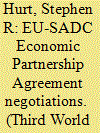| Srl | Item |
| 1 |
ID:
120718


|
|
|
|
|
| Publication |
2013.
|
| Summary/Abstract |
Abstract Not only is the participation of developing countries in international trade negotiations growing, so is their influence over the global trade agenda. This article highlights the increasing activism and impact of African states through a detailed study of the current Economic Partnership Agreement (EPAs) negotiations with the European Union (EU). In examining African resistance to EPAs, the article develops a constructivist approach to North-South trade negotiations that pays close attention to the role of development discourses. We argue that the growing willingness of African states to challenge the EU to deliver on its development promises during the decade-long EPA process was crucial to informing their sustained opposition to the EU's goal of completing a comprehensive set of sub-regional economic agreements. We document African resistance to EU trade diplomacy in the EPAs, exploring how these otherwise weak countries were able to pursue normative-based negotiation strategies by recourse to the EU's promise of a 'development partnership.'
|
|
|
|
|
|
|
|
|
|
|
|
|
|
|
|
| 2 |
ID:
116889


|
|
|
|
|
| Publication |
2012.
|
| Summary/Abstract |
This article focuses on the negotiation of Economic Partnership Agreements (epas) which form the central focus of the commitments made in the Cotonou Agreement, signed in 2000 by the European Union and the African, Caribbean and Pacific (acp) states. epas are part of a much wider trend witnessed since the creation of the World Trade Organization (wto), characterised by the proliferation of bilateral free trade agreements. The article argues that both the material and ideational interests of the EU need to be considered alongside the historical context of EU-acp relations. The EU is making a concerted effort to 'lock in' neoliberalism across the seven different sub-regions of the acp group by negotiating epas that include both reciprocal trade liberalisation and various 'trade-related' issues. In this way epas will go beyond the requirements for wto compatibility, resulting in a reduction of the policy space for acp states to pursue alternative development strategies. The article then considers the potential developmental impact of epas with reference to the negotiations with seven of the 15 member states of the Southern African Development Community (sadc). It is argued that the EU is promoting 'open regionalism', which poses a threat to the coherence of the regional project in southern Africa.
|
|
|
|
|
|
|
|
|
|
|
|
|
|
|
|
| 3 |
ID:
089135


|
|
|
|
|
| Publication |
2009.
|
| Summary/Abstract |
This article addresses the consequences of Washington Consensus and more recently post-Washington Consensus policy for democratic good governance in Africa. It acknowledges the increased focus in recent years of policy-makers on poverty as an important force in world politics. Despite this increased concern the authors argue that International Relations as a discipline fails to offer a suitable framework for understanding poverty as a social force. The article proposes a revival of Robert W. Cox and Jeffrey Harrod's approach based on 'patterns of social relations of production'. This offers a disaggregation of the condition that is often referred to in the literature as 'the poor' or 'the informal sector'. The article then outlines a comparative research agenda based on the cases of Tunisia and South Africa. It demonstrates how these cases provide the sternest test for assessing the authors' scepticism of the prospects of reconciling market-led development with good governance, whilst also offering a 'most-different' comparison given their very different political cultures. In conclusion, the article reflects on the methodological aspects to operationalising such a research agenda and proposes an ethnographic approach informed by the work of Burawoy.
|
|
|
|
|
|
|
|
|
|
|
|
|
|
|
|